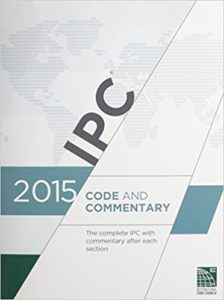International Plumbing Code Commentary 2015
International Plumbing Code Commentary 2015
Mastering code compliance has never been so easy! International Plumbing Code Commentary 2015 will take readers on a journey through the newly updated 2015 International Plumbing Code (IPC), stopping along the way for insightful commentaries that explore both the rationale for, and the practical implications of, the code. Its strategy is simple: give readers the basic technical requirements, and then reinforce that content by discussing the regulations in a real-world context. Coverage includes the historical background for the code, effective methods for applying it, and potential consequences when it is not followed. This unique resource can provide the solid working knowledge that is so critical to professionals in a variety of positions, from code officials and construction workers to building contractors and plumbers.
International Plumbing Code Commentary 2015 CONTENTS
- 1 SCOPE AND ADMINISTRATION
![International Plumbing Code Commentary]()
- 2 DEFINITIONS
- 3 GENERAL REGULATIONS
- 4 FIXTURES, FAUCETS AND FIXTURE FITTINGS
- 5 WATER HEATERS
- 6 WATER SUPPLY AND DISTRIBUTION
- 7 SANITARY DRAINAGE
- 8 INDIRECT/SPECIAL WASTE
- 9 VENTS
- 10 TRAPS, INTERCEPTORS AND SEPARATORS
- 11 STORM DRAINAGE12 SPECIAL PIPING AND STORAGE SYSTEMS
- 13 NONPOTABLE WATER SYSTEMS
- 14 SUBSURFACE LANDSCAPE IRRIGATION SYSTEMS
- 15 REFERENCED STANDARDS
- A: PLUMBING PERMIT FEE SCHEDULE
- B: RATES OF RAINFALL FOR VARIOUS CITIES
- C: STRUCTURAL SAFETY
- D: DEGREE DAY AND DESIGN TEMPERATURES
- E: SIZING OF WATER PIPING SYSTEM
- INDEX
You can also Read International Plumbing Code 2018
International Plumbing Code Commentary 2015 Product details
- Paperback
- Publisher: ICC (distributed by Cengage Learning); 1 edition (November 20, 2014)
- Language: English
- ISBN-10: 1609832906
- ISBN-13: 978-1609832902
- Product Dimensions: 8.2 x 1.2 x 10.5 inches
- Shipping Weight: 3.4 pounds
The law of building regulation is grounded on the police power of the state. In terms of how it is used, this is the power of the state to legislate for the general welfare of its citizens. This power enables passage of such laws as a plumbing code. It is from the police power delegated by the state legislature that local governments are able to enact building regulations. If the state legislature has limited this power in any way, the municipality may not exceed these limitations.


Comments are closed.